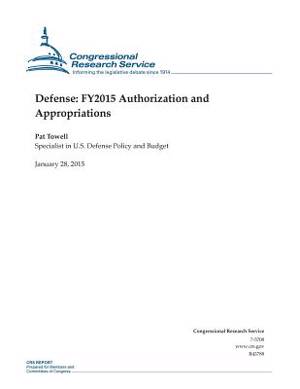
- Retrait gratuit dans votre magasin Club
- 7.000.000 titres dans notre catalogue
- Payer en toute sécurité
- Toujours un magasin près de chez vous
- Retrait gratuit dans votre magasin Club
- 7.000.000 titres dans notre catalogue
- Payer en toute sécurité
- Toujours un magasin près de chez vous
Description
In contrast with the debate over the FY2014 defense budget, congressional action on the FY2015 Department of Defense (DOD) "base budget" (that is, the part of the budget not associated with operations in Afghanistan or other situations designated by the President as emergencies) was not complicated by disputes over the total amount at issue. For both the FY2015 National Defense Authorization Act (NDAA) and the FY2015 Defense Appropriations Act, President Obama's request, and versions of the legislation that were passed by the House, approved by the relevant Senate committees, and finally enacted, varied by amounts that amounted to a small fraction of 1%. The narrow range of disagreements reflected the fact that, in each case, the request and all versions of the legislation were consistent with the binding cap on defense spending in FY2015 that had been established by the Balanced Budget Act of 2013 (P.L. 113-67). For the FY2015 NDAA, the President requested base budget authorizations for DOD totaling $495.5 billion. The version of that bill passed by the House (H.R. 4435) would have authorized $495.8 billion, the version reported by the Senate Armed Services Committee would have authorized $496.0 billion, and the enacted bill (H.R. 3979/P.L. 113-291) authorizes $495.9 billion. (See Table 11.) For base budget programs covered by the FY2015 Defense DOD Appropriations Act (which does not cover the military construction budget), the Administration requested $484.3 billion. The version of the bill (H.R. 4870) passed by the House would have added $166.3 million to that total while the version of H.R. 4870 reported by the Senate Appropriations Committee would have cut $1.1 billion. The final version of the Defense Appropriations Act (Division C of H.R. 83/P.L. 113- 235) provides $$483.7 billion. (See Table 19.) Within those similar gross totals, however, the Administration's budget request and the enacted DOD funding legislation have some significant differences. Both bills either reject outright or defers a decision on several cost reduction initiatives proposed by the Administration. At the same time, both add to the budget billions of dollars for weapons programs and "readiness" improvements that were not included in the budget request. Those added costs, are offset, in part, by reductions which, according to the congressional defense committees, will have no adverse impact on DOD programs. The cost of the congressional additions (in the base budget) is further offset by the fact that some other costs are shifted into the part of the bill that funds war costs (or Overseas Contingency Operations - OCO), and thus are exempt from the statutory cap on discretionary spending. (See "NDAA Highlights" and "DOD Appropriations Overview", below.) The Administration amended its FY2015 budget request for Overseas Contingency Operations (OCO) three times in the course of 2014, each time expanding its scope to fund other emergent DOD activities in addition to combat and post-combat operations in Afghanistan and Iraq. The final version of the NDAA (H.R. 3979/P.L. 113-291) addressed an OCO request totaling $63.7 billion from which it cut $1.5 million. Additions, including $1.25 billion to fund equipment for the National Guard and reserve components and $351.0 million for the Iron Dome anti-rocket system were offset by cuts to the amended request for two new initiatives: The Counterterrorism Partnership Fund (CTPF) (for which the act authorizes $1.3 billion of the $4.0 billion requested) and the European Reassurance Initiative (ERA) for which the act authorizes $370.7 million of the $925.0 million requested.
Spécifications
Parties prenantes
- Auteur(s) :
- Editeur:
Contenu
- Nombre de pages :
- 96
- Langue:
- Anglais
- Collection :
Caractéristiques
- EAN:
- 9781507868331
- Date de parution :
- 28-01-15
- Format:
- Livre broché
- Format numérique:
- Trade paperback (VS)
- Dimensions :
- 216 mm x 280 mm
- Poids :
- 244 g







